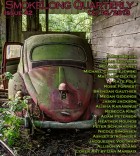For me, this was a story where its form closely mimicked the character’s mindset. The strong images, the use of the second person, almost made me feel as if I were walking through a mind. How important is memory and how people construct their memories to your writing?
I think that our memories are all we really have of other people, and it’s something that frightens me. I have a difficult relationship with photographs, the whole concept of recording our lives, or certain edited aspects of them, and I enjoy writing about people dealing with their memories, wrestling them into some kind of acceptable shape. The narrator of the story is going through what we all go through, I suppose, in that he’s dealing with the past, obsessing over it, while trying to find some kind of way into the future.
Still thinking about images in, “Queuing, Photographs, Morning Eyes,” the story captures how works (songs, fiction) can be distilled to one moment that grabs the imagination. What are moments in fiction that have stuck with you? (For example—In case I worded this a little too vaguely—when I try to remember what exactly happened or what a story is about, I find myself clinging to an image and then rebuilding it from there: So in White Noise, I find myself rebuilding the narrative from the image of the Dylar bottle)
It’s incredible how these books that I love so much as I’m reading them disappear from me very quickly. The narrator forgetting almost the whole of Orlando—a book he loved—is exactly how it often seems to happen to me. Actually, what happens is I remember where I was and what I was doing when I was reading a particular book much more than I remember the actual book: lying in a bath on a day off work reading Powder; riding my bike in a quarry during a childhood summer thinking about getting home and diving back into The Lord of the Rings; sitting on a beach in Brighton reading Marin Millar’s Dreams of Sex and Stage Diving. My memories of almost every book I’ve loved are bound up with my memories of my life at the time.
There’s a range of traumas in this story (trauma in photographs, the numbed narrator, and the final image). How did you work to balance the different blows in your revision and editing process for this story?
The main problem was finding some kind of positivity in terms of a resolution. I didn’t want to leave him stuck at the bus stop eternally, but I wanted some subtlety. I didn’t want him to be rescued from himself, but I wanted to suggest that rescue was at least a distant possibility. I didn’t have an ending at first, but then the story of the horse and its dead rider occurred to me, and it seemed to strike the right balance. These amazing, futile, poignant things do happen, or at least we need to believe that they do.
If you were asked to write “Queuing, Photographs, Morning Eyes: The Sequel,” where would the character be five years later? Are the events of the story things that stay with him/her?
He’s done, now, for me. He’s there perpetually, looking into the ugly woman’s eyes on the bus, and I think that if he were to remember anything of that morning five years down the line, then perhaps it would be this image: sitting on a bus, cold and hungry and miserable, talking to an ugly woman about a dead man and a horse, and trying to find some hope in the whole thing.



 Included in the price of SmokeLong Fitness:
Included in the price of SmokeLong Fitness: